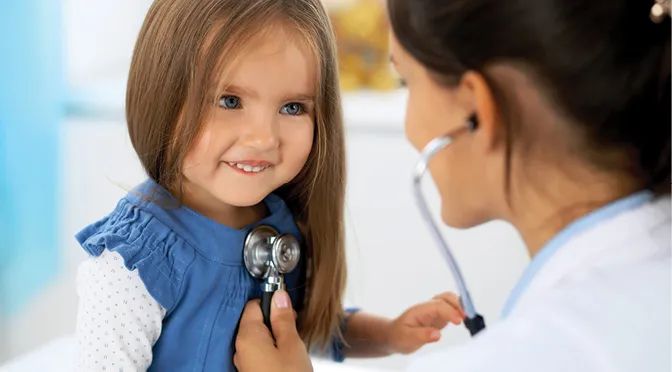
Back to School...And the doctor?
August 1, 2018
by stephanie hobby
Back to school season means more than new backpacks and fresh pencils. It’s also a great time to reassess your student’s health to make sure you’re sending them to school in tiptop shape to learn as well as participate in sports. While you’re making to-do lists to buy glue sticks and scissors, add making appointments with your healthcare providers for complete physicals, eye exams, and dentist appointments.
A complete physical exam is recommended every year for students. Family nurse practitioner Melissa Fuller of Fuller Family Medicine says that’s when healthcare providers will listen to hearts and lungs, make sure weight is appropriate, and discuss healthy food and choices. Babies see the doctor every few months, but after age two, the frequency of doctor visits can be scaled back to once a year. Children must be examined before kindergarten to check for developmental delays and ensure kindergarten readiness.
If you have a child entering kindergarten or junior high, check with your doctor about scheduled immunizations, as that’s typically when students are due for shots.
Sports physicals are another excellent way to assess overall health, but it's important to make sure they are done appropriately. "A real sports physical includes listening to their lungs, checking their joints, and making sure they have no hernias," Fuller said.
If students complain of chest pain or shortness of breath, ask about getting an EKG to make sure your child is healthy enough for physical activity, because the consequences can be dire. “Kids have just died running because they’ve had this heart arrhythmia that nobody knew about,” Fuller said.
She added that students who are headed to college should also make an appointment to catch up on any missed immunizations and have one final visit before leaving home.
Being able to see clearly is an important factor to student success in school, so a yearly comprehensive eye exam, starting around age 3 or 4, is crucial. Eye exams check not only a child’s need for glasses, but can also detect a number of other health conditions, often before other symptoms start. According to optometrists Dr. Joseph Steiner and Dr. Shawn Lebsock of Drs. McBride and Steiner Optometrists, comprehensive eye exams can detect the earliest signs of things like diabetes, cardiovascular issues, high blood pressure, and neurological conditions.
One common condition that can be missed without a full eye exam is amblyopia, meaning the muscles in one eye are underdeveloped, and eyes move at different rates, causing letters to appear jumpy. Sometimes parents come in concerned about dyslexia when it's actually amblyopia. "If we can diagnose that sooner, that can really help with their reading, help with their focus, help with their direction, and in turn, their grades get better. They're more engaged and actually can focus, and words aren't jumping around. They're not getting headaches, and not having to strain," said Dr. Steiner.
They warn that kids might not realize their vision has changed, so even if your child insists they can see fine without glasses, it’s a good idea to get them checked anyway. Common signs that something is amiss are excessive blinking, tiring easily, especially after reading, getting too close to the page or turning their head to use one eye to read. “As with most things, whether it’s something that isn’t serious, or it’s something that is potentially serious and life-altering, early detection is the key,” said Dr. Lebsock.
A whole summer of popsicles, snacking, and campfire s’mores can really take a toll on young teeth, so a dental appointment is a must too. Dr. Tanner Bennion at Pediatric Dental Specialists says lots of sugar is hiding in sports drinks and fruit juices.
“Another sneaky cavity causer is snacking habits,” Dr. Bennion said. “What most parents don't realize is that anything carbohydrate based (bread, pretzels, crackers, etc.) is converted into simple sugars by saliva in the mouth. A quick snack is not a problem, but grazing throughout the day on crackers will wreak havoc on the teeth. Your mouth just needs a few hours to recover after eating.”
Kids need to be seen within six months of when their first tooth erupts, and every six months after that. Proper care for baby teeth is essential because consequences of losing baby teeth at the wrong time due to cavities or infection can be severe. According to Dr. Bennion, a tooth infection can travel quite a ways, and if left untreated, can spread from the tooth to the face, eyes, and throat, which can be a life-threatening problem. Finding and treating problems early can also help alleviate orthodontic expenses later in life too.
“The best thing you can do is bring your child to see his or her dentist for a checkup. They will do a visual exam of your child's teeth and mouth, and likely take X-rays to make sure there are no problems that need immediate attention. The dentist can also provide services such as fluoride, which strengthens the teeth, or placing sealants, which has been proven to reduce the chances of getting cavities,” said Dr. Bennion.
Summer is ideal for appointments because kids don’t have to miss school; according to the American Dental Association, dental disease causes kids to miss more than 51 million school hours per year.
So book those appointments and send your kids back to school with the most important school supply of all - their health.
Originally printed in the pages of Simply Family Magazine’s August 2018 issue.
Never miss an issue, check out SFM’s digital editions, here!





